#space%20exploration
Photo
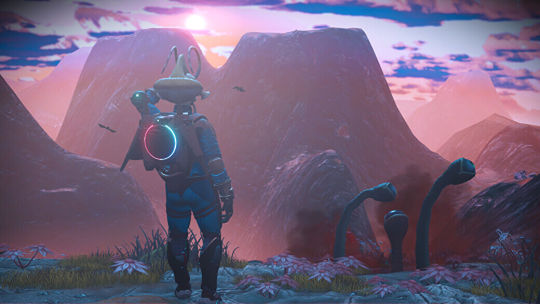
I've been standing here for 15 minute... https://www.xtremeservers.com/blog/no-mans-sky-on-psvr2-glorious-overwhelming-space-exploration/?feed_id=64955&_unique_id=641fa8f128a5c&No%20Man%27s%20Sky%20on%20PSVR2%3A%20glorious%2C%20overwhelming%20space%20exploration
0 notes
Text
New Contemporaries: Archives & Identities - Part 1: Discussion Panel (03/03/21)
I signed up for two events hosted by New Contemporaries; the Archives & Identities Discussion Panel with Duncan Campbell, Althea Greenan, Sunil Gupta, and hosted by Jo Melvin on the 3rd of March , and the Sunil Gupta Workshop on the 4th of March.
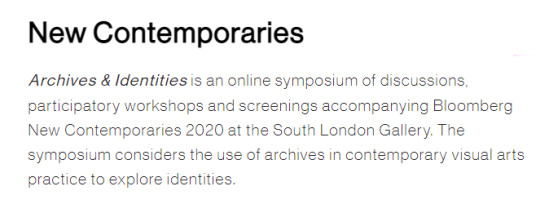
(Screenshot from New Contemporaries Website)
I was drawn to these events as themes of archives and identities are ones that I think, even when my work isn’t explicitly dealing with, underpin much of the meaning of my work. The notion that we, as artists, are creating with our artwork archives for the future is one that to many queer and minority artists is really important; our archives often being limited as the archive is the legacy of the dominant culture. These were themes I dealt with heavily in my dissertation last trimester and Sunil Gupta is an artist who I did a considerable amount of research into while reading around the topic, so I was very interested in attending these events and learning more from his perspective.
The first event; the panel discussion was held via Zoom on the evening of the 3rd of March. IT was really interesting to hear the different artists present their perspectives on the use of archives within their work, and it made me reflect on the different forms an archive can take, and the different roles of archives within artistic practices.
The first speaker Duncan Campell, winner of the 2014 Turner Prize, predominantly discussed his 2008 video piece Bernadett, a 40 minute exploration of the life of Irish dissident and political activist, Bernadette Devlin.
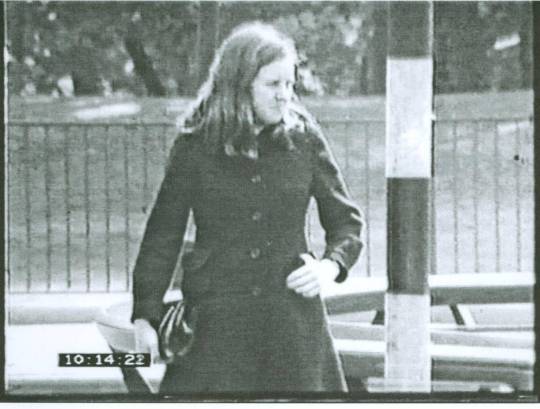
(Image from Duncan Campbell’s Bernadette, 2008)
It was really insightful to hear Campell speak on the process of producing this film and working with archive footage. He discussed the process of researching the archive and finding that it didn’t hold everything he expected; the image the archive has built through omittance was different to what he understood. He discussed the bias of archives; something that developed on the discussion of archives had by Danielle Braithwaite-Shirley and Ebun Sodipo in their artist talk together. He reflected on the way archival footage is framed in archives without explanation, and the fact that Devlin wasn’t the victor in her story, she was obscured in the archive.
This reflection on inclusion and exclusion is something that I find really interesting- and hearing Campell discuss how he reflected this in his own work was really interesting; the process of reframing the footage for a present that wants something from the past.
He finished his discussion with a really thought provoking suggestion, that resonated with me and much of my own thinking about archives and how they record the past, saying that in the archive you can’t find the whole picture - only calcified glimpses. Reflecting on he archive, and why certain material gets preserved, who does the preservation, and what that material supports in its inclusion is something that I often explore within my own work and this notion that we are only afforded ‘calcified glimpses’ back to a past we long to connect to is one that I think is very pertinent.
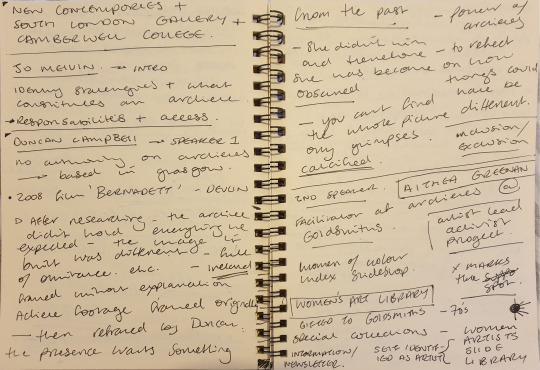
The second speaker, Dr Althea Greenan, is the facilitator of Archives at Goldsmiths, and she discussed the artistit lead activist project the Women’s Art Library which was gifted to Goldsmiths in the 1970s.
The Women’s Art library encouraged self-identifying female artists to document their artwork work; forming a collection of 46,400 35mm slides. Through this process of documenting and sharing, these artists were made visible to each other and able to spread information. This original college creates a huge archive of artwork by women, particularly women of colour, who in the 1970s, had much less opportunity to exhibit work and be conscious in the public eye. It is archives like this that reveal this critical - often otherwise undocumented - histories of people working in ways that do not uphold the values of the dominant culture.
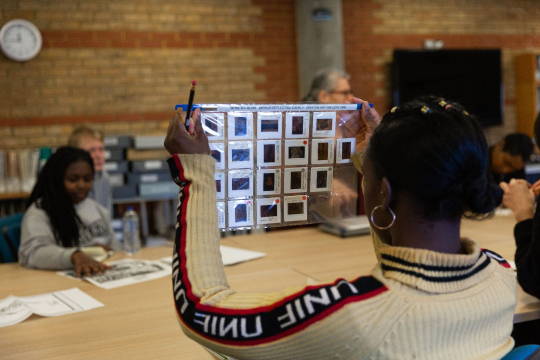
(Image from Barbican Young Curators visit to the Women’s Art Library in 2019)
Greenan is particularly interested in preserving these archives, and how they continue to be valuable, particularly as technology becomes redundant. It was really interesting to hear Greenan discuss how she tackles presenting this archive while preserving the activist identity and integrity of it’s form. She reflects on the form of the documentation, the slides themselves with their metadata and evidence of labour, as being half of the archive themselves - more than just the images, and that to remove these components would be to remove the artist; directly contradicting the archive’s original purpose.
She argues that the process of digitization detracts from the labour and love these pieces hold and represent- yet keeping the archive hidden away in boxes at Goldsmiths too, is keeping the archive from serving its purpose as a legacy of the creativity of often subjugated women. I think this conversation is particularly interesting in this context; where the archive in discussion is predominantly a working class, black women’s archive, and now it is only made accessible within Goldsmiths; an institution, which therefore is subject to institutional issues of racism and structural discrimination.
She discussed the various ways she had explored this process of making the archive available without sacrificing it’s integrity, through presentations, certain digital documentations; not just projecting the artwork but performing it- the slides being preserved not just as images but digital objects.
Overall I thought this was a really interesting discussion about the purpose and legacies of archives, and what happens to them when the technology they are recorded with becomes redundant.
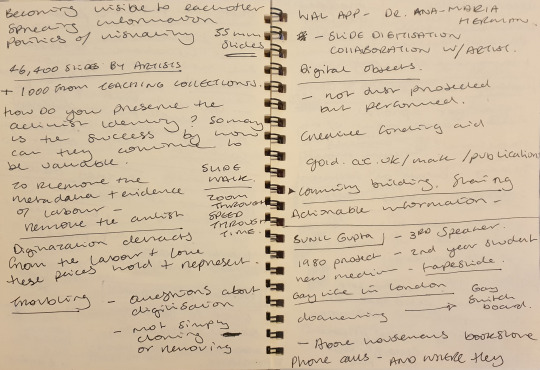
Sunil Gupta spoke next, discussing in particular his work with the Gay Switchboard which until recently hasn’t been publicly presented.
The Gay Switchboard began above Housemans bookshop near Kings Cross in 1974, and served a resource for LGBTQ+ individuals after coming out, and as a way of locating safe spaces, developing in the 80s into a critical resource for the dissemination of information surrounding HIV and AIDS.
vimeo
As a student in 1980, Gupta spent time documenting the work of the Gay Switchboard and wider ‘scene’ in London that the switchboard connected callers too. This work was presented as a tape-slide work with audio, and upon showing the Switchboard their material, it did not receive approval and it was shelved. Recently however there has been curatorial interest in the work, and the work was shown in 2014 at Tate Liverpool as part of Keywords: Art, Culture and Society in 1980s Britain.
This raises interesting questions about the importance and legacy of archives, while at the time the value of Gupta’s work couldn’t be fully realized- this archive of gay life in th early 1980s is extremely valuble now that images and documentation of LGBTQ+ lives in the 1980s are predominantly concerned with the AIDS crisis or otherwise lacking.
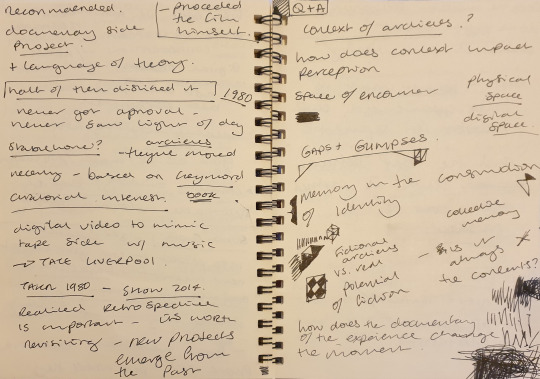
In the Q&A portion of the panel, discussion predominantly turned to ‘gaps & glimpses’, with the panelists discussing the context in which archives are consumed and how this impacts the perception of them. The discussion was really insightful, considering the nuance of documentation, the process of fictionalising and the potential of fiction, as well as the way gaps in archives inform the archives themselves.
I left the discussion thinking about the positive potential of archives and their pull, as well as reflecting on the archives we create now - we all document so much of our lives each day online- in many ways our art instagrams serve the same purpose as the Women’s Art Library - and presumably one day, instagram too with be defunct and what will happen then to the archives created and shared there.
Furthermore, the pandemic has shown us firsthand the way things can dramatically change in the blink of an eye- and now, looking back at photographs of nights out, clubbing, crowds of people, even just being in the studios with friends, these serve as an archive and a portal of something we can currently no longer access- these documents now having a weight and a purpose that couldn’t have been predicted.
https://www.newcontemporaries.org.uk/exhibitions-and-events/events/-archives-identities-panel-discussion
https://www.newcontemporaries.org.uk/current/archives-identities-workshops#:~:text=Archives%20%26%20Identities%20is%20an%20online,arts%20practice%20to%20explore%20identities.
https://www.southlondongallery.org/events/archives-identities-workshops/
https://www.theguardian.com/artanddesign/2014/dec/01/turner-prize-2014-duncan-campbell-wins
https://lux.org.uk/work/bernadette
https://www.tate.org.uk/art/artists/duncan-campbell-12393
https://www.gold.ac.uk/make/artistsdocs/
https://www.theguardian.com/world/2019/oct/10/goldsmiths-university-to-tackle-racism-after-damning-report
https://www.gold.ac.uk/make/collection/
https://switchboard.lgbt/about-us/
https://muse.jhu.edu/article/777711
https://www.tate.org.uk/whats-on/tate-liverpool/exhibition/keywords-art-culture-and-society-1980s-britain
1 note
·
View note
Text
Space Exploration in 1920: In Honor of the SpaceX Falcon Heavy Launch - PDT3K - Science History
Space Exploration in 1920: In Honor of the SpaceX Falcon Heavy Launch – PDT3K – Science History
https://media.blubrry.com/deadideas/ia601509.us.archive.org/11/items/DeadIdeas73SpaceExplorationIn1920_20180213/Dead%20Ideas%2073%20Space%20Exploration%20in%201920.mp3 It’s Valentine’s Day, and this is a valentine to humanity, sort of. In honor of last week’s Falcon Heavy Launch by SpaceX, we’re reading a space exploration article from 1920. What was it like to imagine reaching space at such an…
View On WordPress
0 notes
Photo

Over the space of two years, three of... https://www.xtremeservers.com/blog/two-european-developers-explore-the-lasting-influence-of-japanese-rpgs/?feed_id=51766&_unique_id=63b640d8a5b65&Two%20European%20developers%20explore%20the%20lasting%20influence%20of%20Japanese%20RPGs
0 notes